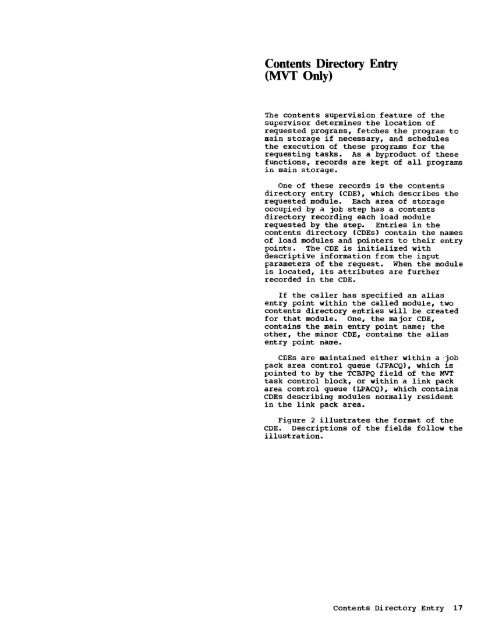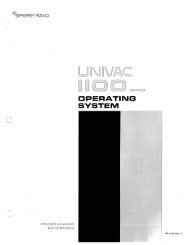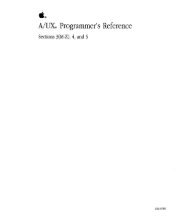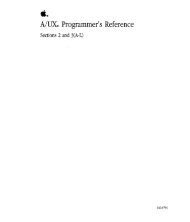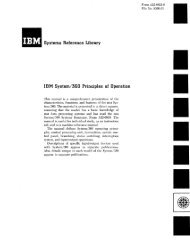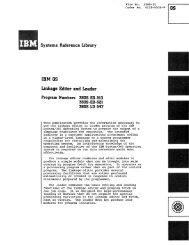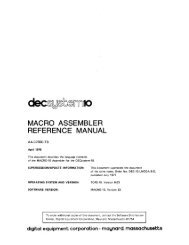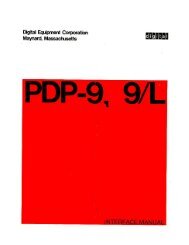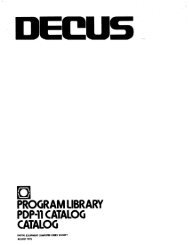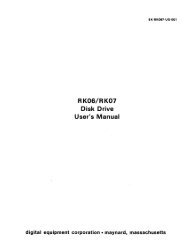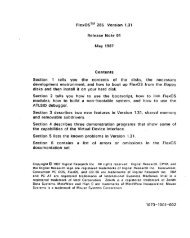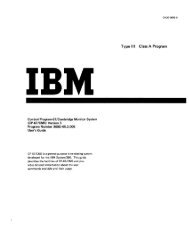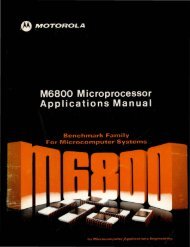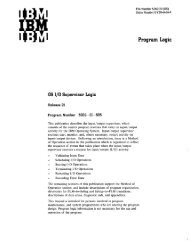- Page 1: Systems Reference Library IBM Syste
- Page 6 and 7: Figures Figure 1A. Pointer Diagram
- Page 11: System Control Blocks System contro
- Page 14: . ..J MFT Figure lA. Pointer Diagra
- Page 20: 20 OS System Control Blocks (Releas
- Page 26 and 27: Offset -8 (-8) 2 Bytes and Field Al
- Page 28: Offset 124 (7C) 4 128 (80) 4 132 (8
- Page 32 and 33: 32 OS System Control Blocks (Releas
- Page 34: 0(0) 4 (4) 8 (8) 12 (c) 16 (10) 20
- Page 38: 38 OS System Control Blocks (Releas
- Page 44: DATA CONTROL BLOCK -- SAM Continued
- Page 58: Offset 53 (35) • 3 56 (38) 1 57 (
- Page 62: Device Interface 16 (10) Common Int
- Page 66 and 67:
Offset 16 (10) 1 11 (11) • 1 18 (
- Page 68 and 69:
Offset 40 (28) 8 48 (30) 1 49 (31)
- Page 70 and 71:
Offset Bytes and Field Alignment Na
- Page 72:
Offset Bytes and Field Alignment Na
- Page 76:
Device Interface 16 (10) Common Int
- Page 79 and 80:
Offset Bytes and Field Alignment Na
- Page 81 and 82:
Offset Bytes and Field Alignment Na
- Page 84:
WTTA Interface 16 (10) DCBBQFLG Dat
- Page 87:
Offset 20 (14) 1 21 (15) • 3 24 (
- Page 90 and 91:
90 OS System Control Blocks (Releas
- Page 94:
Offset Bytes and Field Alignment N
- Page 103:
DATA CONTROL BLOCK -- TCAM The form
- Page 107 and 108:
Offset 33 (21) • 3 36 (24) 1 37 (
- Page 110 and 111:
Offset 52 (34) 1 52 (34) 4 56 (38)
- Page 112 and 113:
112 OS System Control Blocks (Relea
- Page 114:
Appendage Table DATA EXTENT BLOCK -
- Page 119 and 120:
offset -36 (-24) 4 -32 (-20) 4 -28
- Page 121 and 122:
Offset Bytes and Field Alignment Na
- Page 124:
Offset +0 +0 +0 +1 +0 +4 +8 +0 +4 +
- Page 127:
DATA EXTENT BLOCK -- QTAM MESSAGE P
- Page 131 and 132:
Offset 48 (30) 4 52 (34) 1 53 (35)
- Page 134 and 135:
- 36 (- 24) -32 (-20) -28 (+ lC) -2
- Page 136:
136 OS System Control Blocks (Relea
- Page 139 and 140:
DATA EVENT CONTROL BLOCK -- BSAM Th
- Page 141 and 142:
Offset 12 (e) 4 16 (10) 4 20 (14) 4
- Page 143 and 144:
DATA EVENT CONTROL BLOCK -- BlSAM T
- Page 146 and 147:
146 OS System Control Blocks (Relea
- Page 148:
o (0) DATA EVENT CONTROL BLOCK -- B
- Page 151 and 152:
DATA EVENT CONTROL BLOCK -- QTAM Th
- Page 153 and 154:
DATA EVENT CONTROL BLOCK -- BTAM Th
- Page 157 and 158:
Offset Bytes and Field Alignment Na
- Page 159 and 160:
Offset 28 (lC) 29 (lD) • 1 Bytes
- Page 161:
Device Name Table The device name t
- Page 164 and 165:
164 OS System Control Blocks (Relea
- Page 166 and 167:
166 05 System Control Blocks (Relea
- Page 168:
10 (0) ....,r- 44 (2C) DS1FMTID For
- Page 174 and 175:
174 OS System Control Blocks (Relea
- Page 177 and 178:
72 (48) FORMAT 2 -- INDEX DATA SET
- Page 179 and 180:
Offset 64 (40) 2 Bytes and Alignmen
- Page 181 and 182:
FORMAT 3 -- EXTENSION DATA SET CONT
- Page 185 and 186:
Offset o (OJ 44 44 (2C) 1 45 (2D)
- Page 188:
...... ---r 0(0) 4 (4) 44 (2C) DS5F
- Page 191 and 192:
FORMAT 6 -- SHARED EXTENT DATA SET
- Page 193 and 194:
Data Set Labels -- Magnetic Tape Th
- Page 196 and 197:
o (0) :.::: 4 (4) .,r- Continued Co
- Page 198 and 199:
198 OS system Control Blocks (Relea
- Page 200:
0(0) 4 (4) 16 (10) 36 (24) FL2RECFM
- Page 203 and 204:
Event Control Block The event contr
- Page 206:
INTERRUPTION CONTROL BLOCR 0(0) ICB
- Page 209:
Input/Output Block The input/output
- Page 214:
Offset Bytes and Field Alignment Na
- Page 220:
Offset Bytes and Field Alignment Na
- Page 227 and 228:
Offset 68 (44) 1 70 (46) •• 2 7
- Page 232:
Offset 101 (65) • 1 101 (65) •
- Page 236 and 237:
236 OS System Control Blocks (Relea
- Page 238 and 239:
JOB STEP CONTROL BLOCK 240 (FO) JSC
- Page 240:
240 os System Control Blocks (Relea
- Page 245 and 246:
Offset 40 (28) 2 40 (28) 41 (29) 42
- Page 253 and 254:
Offset 96 (60) 1 91 (61) • 3 100
- Page 256 and 257:
256 OS System Control Blocks (Relea
- Page 263:
Offset I o (0) 8 8 (8) 3 *tes and ,
- Page 268 and 269:
Offset Bytes and Alignment I 24 (18
- Page 270 and 271:
270 OS System Control Blocks (Relea
- Page 274:
Offset Bytes and Field A1ignment Na
- Page 277 and 278:
Offset Bytes and Field Alignment Na
- Page 279 and 280:
REQUEST BLOCKS -- MVT CONFIGURATION
- Page 281 and 282:
Interruption Request Block -- MVT T
- Page 285:
proqram Request Block -- MVT The pr
- Page 291 and 292:
Offset o (0) B 8 (8) 1 9 (9) • 1
- Page 293 and 294:
Supervisor Request Blocks -- MVT Th
- Page 295 and 296:
Supervisor Request Block -- MVT --
- Page 297 and 298:
SUPERVISOR REQUEST BLOCK -- MVT --
- Page 302:
302 OS system Control Blocks (Relea
- Page 306:
Offset o 1 2 4 8 (0) 1 Bytes and Fi
- Page 309 and 310:
Bytes and Offset Alignment 105 (69)
- Page 312 and 313:
312 OS System Control Blocks (Relea
- Page 314 and 315:
1-32 (20) r- L,. 0(0) 4 (4) 8 (8) 1
- Page 316 and 317:
Bytes and Field Offset Alignment Na
- Page 322 and 323:
322 OS System Control Blocks (Relea
- Page 325 and 326:
1116 (74) 120 (78) 124 (7C) 128 (80
- Page 328 and 329:
Offset 31 (IF) 32 (20) Byte and Fie
- Page 331:
Offset 168 (AB) 4 172 (AC) 1 173 (A
- Page 334 and 335:
TIMING CONTROL TABLE 0(0) TCTQA 3 (
- Page 337 and 338:
Offset o (0) 3 Bytes and Field Alig
- Page 339 and 340:
Offset o 4 6 8 10 +0 (0) 4 (4) 2 By
- Page 344:
Offset +3 +4 +12 +15 +0 Bytes and F
- Page 352:
UCS 1403 Printer Extension 0(0) 4 (
- Page 357:
Offset Bytes and Field Alignment Na
- Page 360:
Offset 45 (2D) • 3 48 (30) 8 56 (
- Page 364:
Offset Bytes and Alignment 10 (A)
- Page 369 and 370:
MAGNETIC TAPE DEVICE CLASS UCBTYP B
- Page 371:
Byte 1 lOS Flogs I Model Code I UCB
- Page 374:
UCB + 16 (10) Offset 16 (10) 1 Byte
- Page 378 and 379:
378 OS System Control Blocks (Relea
- Page 381 and 382:
ASCII Volume Header Label I 0 (0) 1
- Page 383 and 384:
Volume Table of Contents The volume
- Page 385 and 386:
Volume Table of Contents The volume
- Page 387 and 388:
Time-Sharing Option Control Blocks
- Page 389:
Driver Parameter Area The driver pa
- Page 392:
ENVIRONMENT CONTROL TABLE 0(0) ECTR
- Page 395 and 396:
Protected Step Control Block The pr
- Page 397 and 398:
Offset o (0) 7 Byte and Field Align
- Page 399:
Time-Sharing Job Block The time sha
- Page 404 and 405:
404 OS System Control Blocks (Relea
- Page 412 and 413:
412 OS System Control Blocks (Relea
- Page 415 and 416:
Indexes to system reference library
- Page 417:
liO coo.nter table 339 I/O lookup t


